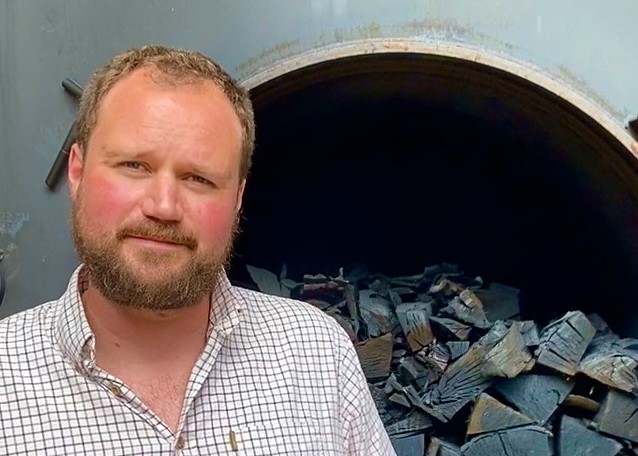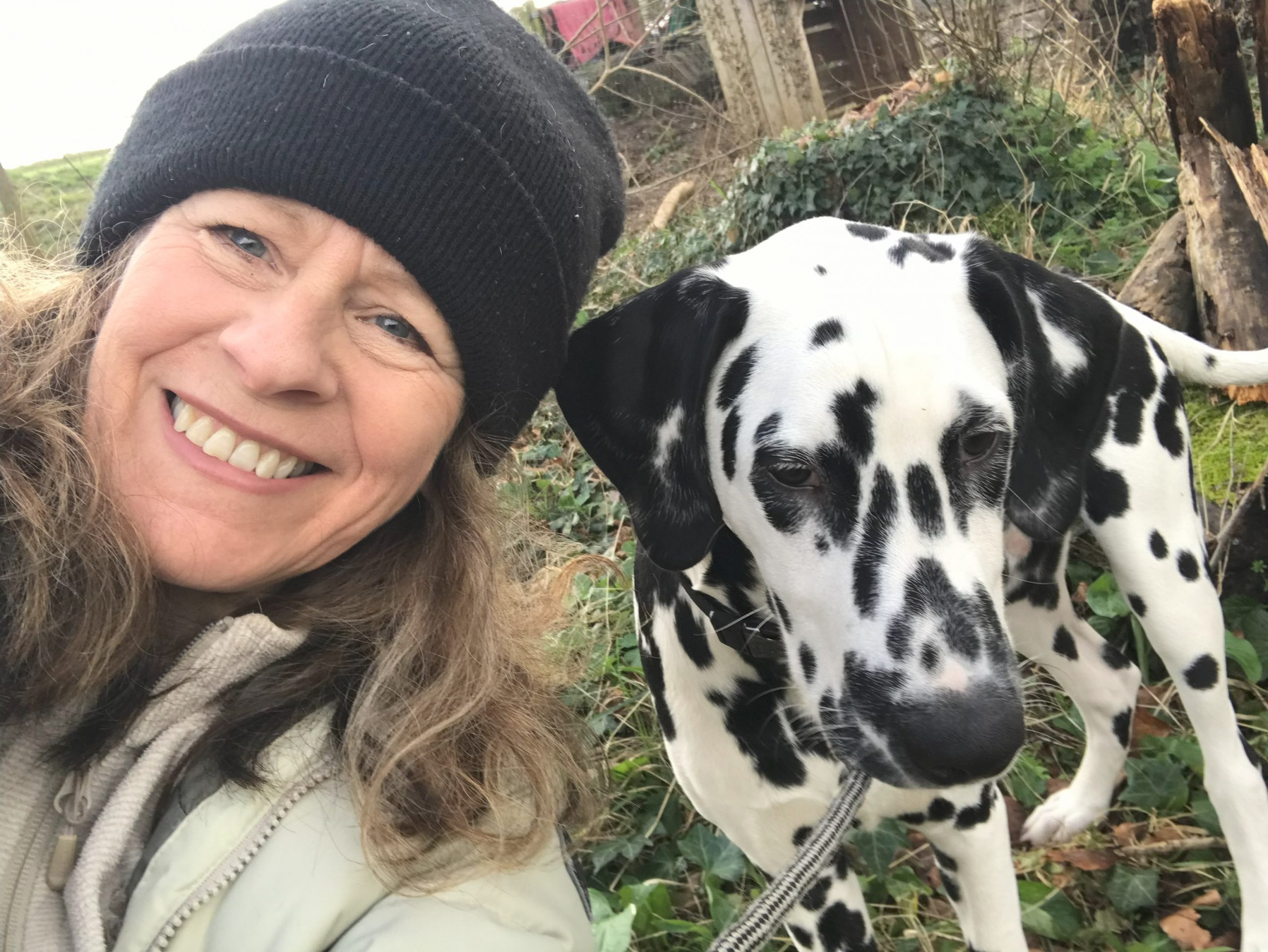In this occasional series of interviews, we talk to truly inspirational people conducting groundbreaking work in sustainability.
Our latest guest in the 100 Ways hot seat is pioneering changemaker Luke Breedon, who runs the Slate Hill Charcoal Company with his wife Helen.
Can you explain what Slate Hill produces – and what the products are used for?
At Slate Hill Charcoal we mainly produce sustainable barbecue charcoal. This is what we set out to produce and still is our highest volume product. Alongside this we also make biochar, which is used for both carbon capture and removal but also dozens of other incredibly beneficial ways such as soil improver, animal feed or bedding and even as a semiconductor in novel battery technology.
Take a look at https://www.biochar-journal.org/en/ct/2 for an article about 55 uses of biochar! We also make lots of other products such as biochar kilns, wood vinegar, smoking woods, blacksmiths’ charcoal and more recently my daughters and I have even made charcoal soap!
What’s the benefit, for consumers and for the planet?
Although barbecue charcoal releases any carbon it contains when you use it as a fuel, you have to consider this a relatively short term carbon cycle. A tree may have been growing and sequestering carbon for 30 or 40 years; when we harvest it and convert it to charcoal, much of that carbon is locked up in the black lumps you use on your grill. Ours contain around 85% carbon. Compare this to natural gas which is made over millions of years. It also helps to make woodland management economically viable, which in turn increases the carbon capture and biodiversity of our UK woodlands. A lot of charcoal on the market is from abroad (95%!), and some of it from dubious sources. We regularly get offered to buy imported charcoal from countries such as Nigeria, Paraguay, Brazil, Indonesia and Vietnam. The other day somebody offered us mangrove charcoal, which really made my blood boil.
If you don’t burn charcoal then it can be considered biochar, a recalcitrant material that has a huge absorbent surface area and a slight electrical charge that mean it can hold onto water, nutrients and microbiology. Think of it as a home for microbes and funghi. Pop it in your compost or food waste bin to supercharge your organic waste, or spread it in your chicken coop to reduce ammonia and therefore smells and foot issues – before using it in your garden as a fertiliser. On a recent study tour to the US (inset by biochar production personally!) I even stayed with a biochar advocate who used it with bokashi in a composting toilet system before spreading it on her veggies!
What did you do prior to setting up Slate Hill Charcoal – and what motivated you to turn your back on that career?
Before Helen and I set up Slate Hill Charcoal I worked for a large farming company, at the time the largest in the UK. Although I loved farming the opportunity to do something ourselves, whilst benefiting the planet, and seeing more of my family as they grow up was hard to beat. We have something that we are really passionate about, and that makes all the risks and stresses worth it.
What’s your typical day like?
Varied! We aim to make charcoal throughout the year, so the processes of cutting wood, loading and unloading our retort (charcoal oven), bagging and boxing are fairly consistent but not routine. We also produce and retail small scale biochar kilns as the UK agent of an American company, High Plains Biochar. More recently I have been lucky enough to be awarded a Nuffield Farming Scholarship* to look at how we can use biochar in agriculture. This means I have been travelling around the world (again, inset with biochar) and speaking to those involved in the industry in order to discover the benefits it could bring to British farmers. Currently writing my report, I will be presenting my findings at the Nuffield Conference in Belfast in November, so stay tuned! In all this, it’s a pleasure to be able to take my daughter to school every morning.
As a young start-up in sustainability, what have been your biggest challenges?
One of the biggest is the competition from cheap and environmentally damaging imports, many of them claiming to be sustainably sourced. There is no regulation around charcoal in the UK, and even the FSC has said that some certificate holders may be in violation. Often when we call ourselves “sustainable” we can come across as preachy, but we really need to spread the knowledge that some of the charcoal in supermarkets and garages really is ‘rainforest in a bag’.
And biggest successes?
Being awarded my Nuffield scholarship has definitely been a highlight of our journey so far. It opens the door to so many opportunities to spread the word about biochar and its potential to sequester carbon whilst economically and environmentally benefiting farming practices.
Funniest or weirdest moment?
Who knew of all of the interesting ways that charcoal, biochar and wood vinegar are being used? We currently supply to a bronze age swordsmith, a professor investigating wood vinegar use in the mummification process, somebody developing a closed loop domestic water filter, someone else making gunpowder and even one of George Clooney’s film sets!
What keeps you going when you fear everyone’s journey to Net Zero is going far too slowly?
It can be really infuriating to see the excessive use of natural resources for no real gain, or the huge amount of waste we produce often due to financial viability. My eyes have been opened on some of my Nuffield visits that there are actually people doing some incredible work behind the scenes to get us on our way to Net Zero. Just because it may not be as mainstream quite yet doesn’t mean that within the next decade things will look very different.
What’s your top tip for easily achievable things people can do either at work, at home or at play to be more sustainable?
Knowledge is key. Ask where things have come from, how they have been produced and how they will be disposed of before making decisions.
What’s the most exciting sustainability development you’ve heard about recently?
We are involved in a project that has an amazing amount of circularity. A farm in the South East is hoping to install a continuous flow biochar kiln that will act a bit like a traditional biomass boiler, but bring many more benefits. It will use wood chip from previously under-managed woodland to produce heat for a black soldier fly (‘super flies’ renowned for their bioconversion of organic waste into a sustainable source of animal feed) and free range hen laying enterprise, whilst also producing biochar which will be used in poultry bedding to reduce ammonia and lock up nutrients. Some will also be mixed with the frass (debris produced from the flies) to make an amazing fertiliser. It will be first sort of project in the UK to our knowledge and will help to offset on-farm emissions down to Net Zero, with any excess being offered to local business.
And finally, what’s next for Slate Hill Charcoal?
We have had a very busy couple of years but we hope to spread the message about sustainable charcoal and biochar to as many as possible, for the benefit of our planet, our farms, food and woodland.
*The Nuffield Farming Scholarships Trust is a charity organisation whose aim is to bring positive change to agriculture through the development of its future leaders, sending them overseas to learn from others and helping them share their brilliant ideas when they return home.





